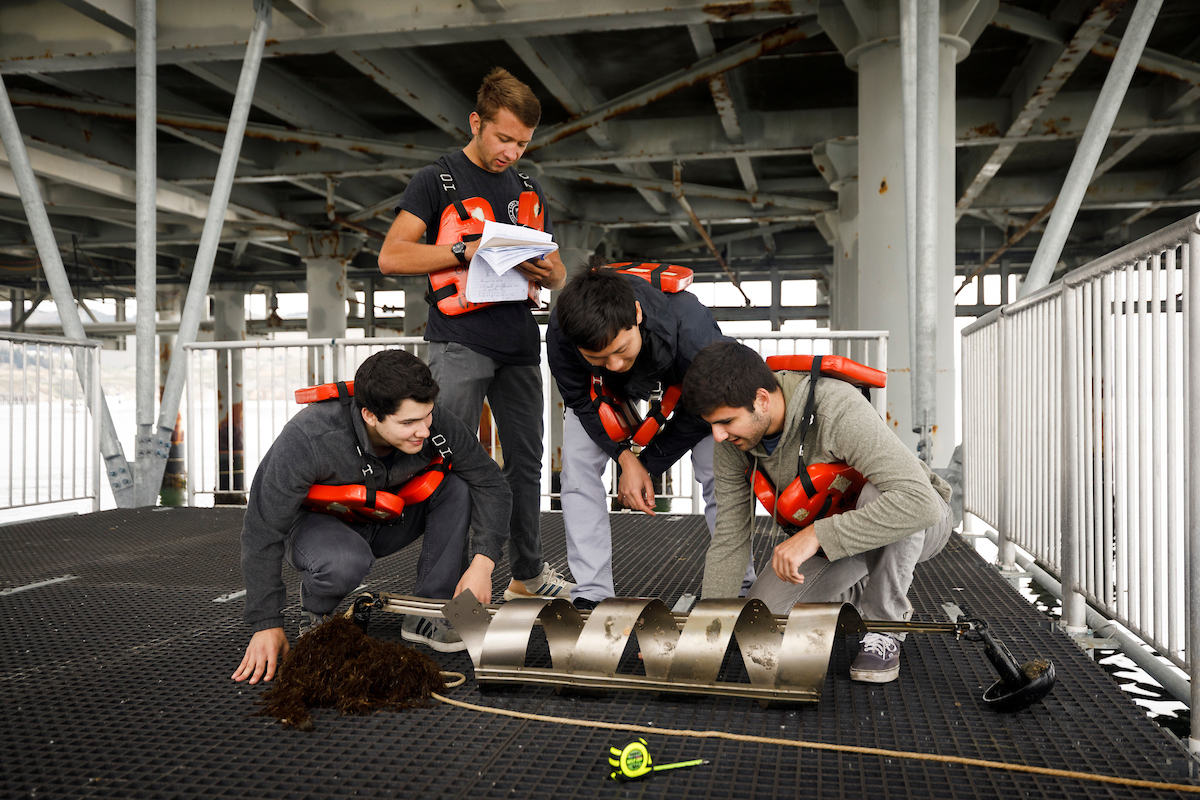The Cal Poly Materials Engineering Department offers the only primarily undergraduate materials engineering program of the 53 materials science and engineering departments in the United States. It is student-centered with lots of hands-on learning by doing. Faculty and staff are dedicated to providing a positive learning environment where students learn engineering fundamentals, gain experience with materials characterization and testing equipment, and develop teamwork and professional skills. The MATE curriculum allows flexibility with breadth electives, as well as specialization with technical electives.
Modified from mate.calpoly.edu
Senior Projects from 2025
Synthesis and Testing of a Biodegradable Composite from Agricultural Waste, Amanda Anne Avrit and Kyla Carlson
Environmentally Friendly Removal of Positive and Negative Photoresist from Silicon Wafers with and Without a Silicon Dioxide Film, Andre Frcek and Alex Garton
Chemical Recycling of PET Plastic Waste, Charlie Parker, Benjamin Puga, and Jake Verschoor
Expanded Polystyrene and Terpene Resin Tackifier Dispersions to be Used in Natural Rubber Latex Pressure Sensitive Adhesives, Quincy B. Taylor and Cassius Taylor
Design, Modeling, and Testing of a Novel Inductor for Electric Vehicles: Iron Nitride Soft Magnetic Composites, Macen Wahoske and Jesse Alan Winkel
Degradation Characterization of Nopal-based Biopolymer made from Opuntia sp. Juice, Beeswax, Animal protein, and Polyvinyl Alcohol, Logan Williams, Mary Elizabeth Holland, and Spencer Williams
Senior Projects from 2024
Characterization of High Albedo Ground Surface Treatments for Energy Harvesting by Bifacial Photovoltaic Power Plants, Roma C. Chatripally, Matthew Honda, and James Vance
Metallurgical Impact of Switching from Hammer Units to Hydraulic Presses for Forging, Cole Hawker and Jacob Reed
Design, Modeling, and Testing of a Novel Inductor for Electric Vehicles: Iron Nitride Soft Magnetic Composites, Cody Krawczyk and Lauren Walker
Porous Ceramics as an Alternative to Polymer Filters, Lucy K. Sheerin and Riley C. Stallings
Senior Projects from 2023
Interlaminar Tensile Properties of Unidirectional and Woven Carbon Fiber Reinforced Toughened Epoxy Laminates, Eric Timothy Casey and Sean McKalip Thompson
Covalent Adaptable Networks for Wood Coatings, Jachin Boaz Clarke
Improving the Tensile Mechanical Properties of Direct Energy Deposited (DED) Inconel 718 Aircraft Components Using a Standard Heat Treatment, Spencer Vincent Flynn
Design, Modeling, and Testing of a Novel Inductor for Electric Vehicles: Iron Nitride Soft Magnetic Composites, Sydney F. Fultz-Waters and Jacob Krynock
Novel Tool Steel Alloy P179-X17 made with Rapid Alloy Development for Additively Manufactured Die Inserts to be used in Aluminum Injection Molding, Amy Harter and Jack Leimbach
Effect of Environmental and Ultraviolet Degradation on the Albedo of Polyethylene Sheet Materials for Improved Energy Harvesting by Bifacial Photovoltaic Power Plants, William A. Jang and Roxy H. Jackson-Gain
Investigation into Oxygen Diffusion as it Relates to Alpha Case Formation in Ti-6Al-4V Based on Different Forging Thermal Cycles, Tyler J. Meador, Jon Leduc, and Francesca Hope
The Effects of Dissolved Hydrogen on the Mechanical Properties and Fracture Behavior of SE508 Nitinol Wire For Biomedical Components, Kathryn Linn Meany and Ryan Zhao Thompson
Optimizing the Induction Coil Heat Treatment Parameters for Golf Club Iron Hosels to Facilitate Room Temperature Bending, Brissa Rico and Davis Schell
Surface Characterization of Low-Density Polyethylene Mulch, Risha Shah
Metallographic and Thermal Processing Investigation of a New Al-Based Crashworthy Alloy for Additive Manufacturing, Nathalie Joyce Silva and Samuel Myer Ettelstein
Failure Analysis of Variably Sized 4340 Steel Mandrels Utilized in the Production of Seamless Superalloy Rings through the Vertical Ring Rolling Process, Mikhail Alexeyevich Vasilyev and Joshua Brady Venz
Senior Projects from 2022
Deep Ocean Vehicle (DOV) Scientific Payload, Nichole "Nikki" T. Arm, Mason Gariepy, Brianna Roberts, and Kyle C. Walsh
Stabilization of Palm Wood using Water-based Impregnation, David A. Barnes
Effect of Oxygen Equivalence on the Strength and Toughness of Ti-6Al-4V Forgings, Kira Baylor and Clarissa Drouillard


